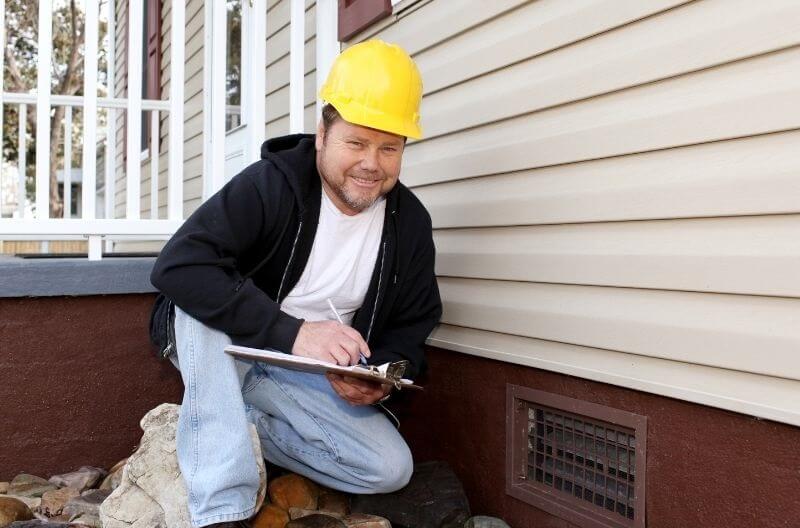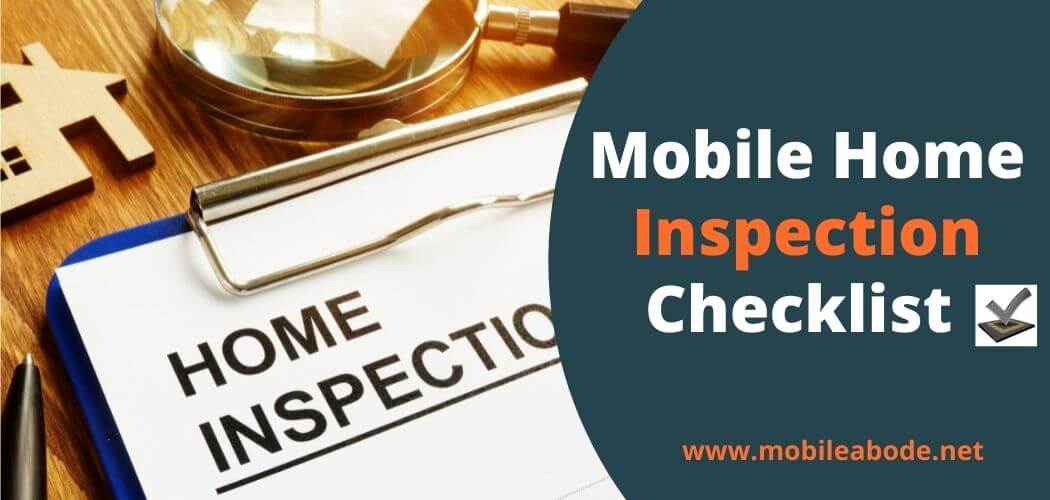If you’re thinking of purchasing or selling a mobile home, it’s important to know what defects are common to the homes. It’s also good to know how much they cost and why they can be cheaper than site-built homes.
For those reasons, I’ve created this mobile home inspection checklist so you don’t get stuck with an expensive headache!
If you’re looking for a mobile home inspection checklist, look no further! I’ve got you covered. It all starts with having your contract inspected by an inspector and ends with the walkthrough inspection before closing day.
Make sure to check out my article on making sure everything is in working order so that you don’t feel like the biggest idiot ever when something isn’t working on moving day!
Mobile Home Inspection Checklist (2022)
Here are 12 things those mobile home inspectors look at during the inspection of mobile homes.
1. Structure
A professional inspector will check out all of this, but you should know what they are looking for – things like steady beams and posts, no major cracks in the foundation, dirt flooring is firmly packed down etc.
This isn’t exactly my area of expertise so I’m going to recommend that you get a professional inspection if this aspect concerns you.
2. Slab foundation
The home must be set on a solid, level poured concrete slab or other foundation. All homes built before 1976 need to be evaluated for poorly-cured cement and improperly installed anchors.
This is an important safety issue for your inspector and you should take it very seriously.(Also Check: Mobile Home Leveling Cost)
3. Foundation wall flashings
Any areas where the concrete of the slab meets earth should be sealed with a water-resistant material. These areas can crack and leak, causing damage to your mobile home.
4. Foundation cracks
If your mobile home’s foundation has any cracks in it, this needs to be fixed before closing on the home. Move-in day is no time for landscaping projects.
5. Floor joists
Floor joists need to be installed at 16″ on center and be a minimum of 3/4″ in thickness for homes built before 1976 or 2″ in thickness for homes built after this year.
Dimensional lumber is better than plywood when used as flooring underlayment. Floor joists should always be level and dry-fit together so that they do not warp during the manufacturing process.
6. Attic access
An exterior hatch or stairs leading to the attic is preferred, though a pulldown ladder is acceptable as well. If the door leading to the attic from inside your home is missing, you will need to have it installed before closing day.
7. Electrical
An electrician should inspect the wiring on the home before you purchase it.
If there are knob-and-tube wires, your inspector will advise you to have them replaced by a professional electrician with modern materials.
If there aren’t any knob-and-tube wires, they can be left alone. It’s important to note that some states do not allow these types of wires to be covered up at all for safety reasons.
8. Heating/cooling systems:
You’ll want to check out heating and cooling systems during the walkthrough inspection before closing day.
Central heating units are preferred over window units since they are less likely to break down or lose efficiency over time. Safety first people! Window units also often lose more heat than they provide, making them a less energy-efficient option for heating your home.
Also Read: How Much Are Mobile Home Windows?
If you’re buying an older mobile home with electric baseboard heating units, make sure the wiring is up to standards and that there aren’t any broken radiators or fuses/breakers missing.
9. Steam radiant floor heating
If your home has this type of system installed, someone with experience in how it works should look at it before closing day.
It would be unfortunate if you moved into your new home only to find out that you couldn’t use portions of the house during the winter because the radiant heat was on! Grease filters need changing as well.
Lots of things need inspection here so I wouldn’t recommend doing this yourself unless you know what you’re doing.
10. Cooling systems
If your mobile home has a window unit air-conditioner, have it inspected before purchase. You should also have sprinkler systems checked out for any leaks or weak spots.
11. Fireplaces/wood stoves
A heating inspection would be incomplete without checking out the fireplace and woodstove to ensure they are up to code and safe to use.
Make sure that there aren’t any pieces of the chimney missing, loose bricks or cracked mortar between the bricks. Ideally, an inspector will look at this both when cold outside (to check for gas leaks) and hot outside (to make sure the flue operates properly).
It would be awesome if someone could do this for you since it can be dangerous to try and do it on your own, but you need to know where the inspection stands on this.
If the fireplace has a TV/VCR player installed in front of it for decoration, just rip that out. Who needs that? It’s probably messed up anyway. You don’t need any distractions while you’re trying to enjoy your new wood-burning stove!
You will also want the chimney and the area around it cleared of snow and debris before you purchase a home with a wood-burning heater so you can see if there are any weak points or cracks.
12. Plumbing
Your inspector will be making sure that there aren’t any leaks, your water is OK to drink and all of the plumbing fixtures are in proper working order.
If it’s a city sewer system, make sure it isn’t full up! A plumber will do an excellent inspection for this as well as how far away is the septic tank from the leach lines and other water sources (like wells).
This is part of what I call “thoroughness” inspections – not only does an inspector check well materials were put together but they also check where the water line connects to the well.
If there are any cracks or weak spots in this area, you’ll need to make sure they get fixed before the closing day!
If your home uses a septic system instead of a city sewer, an inspector will check it out for any leakage. Make sure the inspection covers all aspects of the septic system – from how deep the tank is buried and if it has enough capacity to whether or not there are leach fields that are close to other wells or bodies of water.
If your mobile home park has its own sewage/wastewater treatment facility, have this checked out as well since you don’t want anything backing up while you’re trying to sell your property!
Related Article: What Is Underbelly Of A Mobile Home And Cost To Replace It?
Mobile home inspection Cost
The cost of inspecting a mobile home can vary depending on the size and type of your home and what you want inspected.
So the answer is different depending on the complexity of the inspection, but for an average-sized mobile home, it could cost anywhere from $250 to $400. Don’t worry about these prices though – it’s worth every penny!

If you’re looking to sell, it’s common for sellers to pay for inspections upfront but if you’re inspecting while buying, an inspector will usually charge you once they finish their report after purchase (which is when their fee is due).
If you’re not sure about some aspect of your home’s inspection, call the inspector to find out.
However, make sure their answer makes sense to you! If they seem vague or unsure of themselves, I would cross that inspector off your list and hire someone else – it’s just not worth dealing with anyone who doesn’t seem knowledgeable.
Conclusion:
If you have a mobile home, it is important to know how the property was built and whether there are any possible safety concerns.
You can find out by hiring an inspector that will come out and look at your house from top to bottom for defects or other issues. It’s worth investing in this service because many of these inspectors offer very affordable pricing packages for their services.
The cost of a mobile home inspection varies depending on the size and age of the unit.
For example, if you have an older mobile home that is in poor condition, your inspector may charge more to inspect it than they would for newer units due to an increased likelihood of structural issues.

